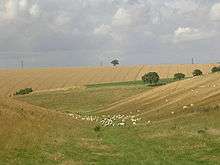The Wolds
The Wolds is a term used in England to describe a range of hills which consists of open country overlying a base of limestone or chalk.[1]

Geography
The Wolds comprise a series of low hills and steep valleys underlain by calcareous (chalk and limestone) and sandstone rock, laid down in the Cretaceous period. The characteristic open valleys of the Wolds were created during the last glacial period through the action of glaciation and meltwater.[2] The chalk that underlies the Chalk Wolds Landscape Character Type extends from the Yorkshire Wolds to the south coast of England, in East Sussex and in Dorset.[2] Geologically, the Lincolnshire Wolds is a continuation of the Yorkshire Wolds which runs through the East Riding of Yorkshire; the point at which the ranges of hill crosses the Humber is known as the Humber Gap.[2]
Etymology
The name Wold is derived from the Old English wald meaning "forest", (cognate of German Wald, but unrelated to English "wood", which has a different origin).[1] Wold is an Anglian form of the word, as in other parts of England, different variations can be found.[3]
Over the years the meaning has changed from "forest" to "open high ground". Wold originally would have applied to high forest land. However when the forest was cleared, it is probable that the original name survived. This was particularly true in the Cotswolds, the Lincolnshire Wolds and also the Yorkshire Wolds.[1]
Example of Wolds in literature
Westward before her rose fold upon fold of the encircling hills, piled rich and golden.
Description of the Yorkshire Wolds by Winifred Holtby.[4]
See also
| Wikimedia Commons has media related to Lincolnshire Wolds. |
| Wikimedia Commons has media related to Yorkshire Wolds. |
- The Weald (West Saxon variation)
Citations
- Gelling. pp. 222–227
- "Access to Evidence". Natural England. Retrieved 23 September 2018.
- Oxford Dictionary of English Etymology, edited by C. T. Onions, Oxford, 1966. p. 1011
- Holtby. Anderby Wold. Ch. 1
References
- Gelling, Margaret (2000). Place-Names in the Landscape. London: Phoenix. ISBN 1-8421-2264-9.
- Holtby, Winifred (1923). Anderby Wold. London: The Bodley Head.
- Onions, C. T.; Friedrichsen, G. W. S.; Burchfield, R. W., eds. (1966). The Oxford dictionary of English etymology. Oxford: Oxford: Claredon P. OCLC 251553598.